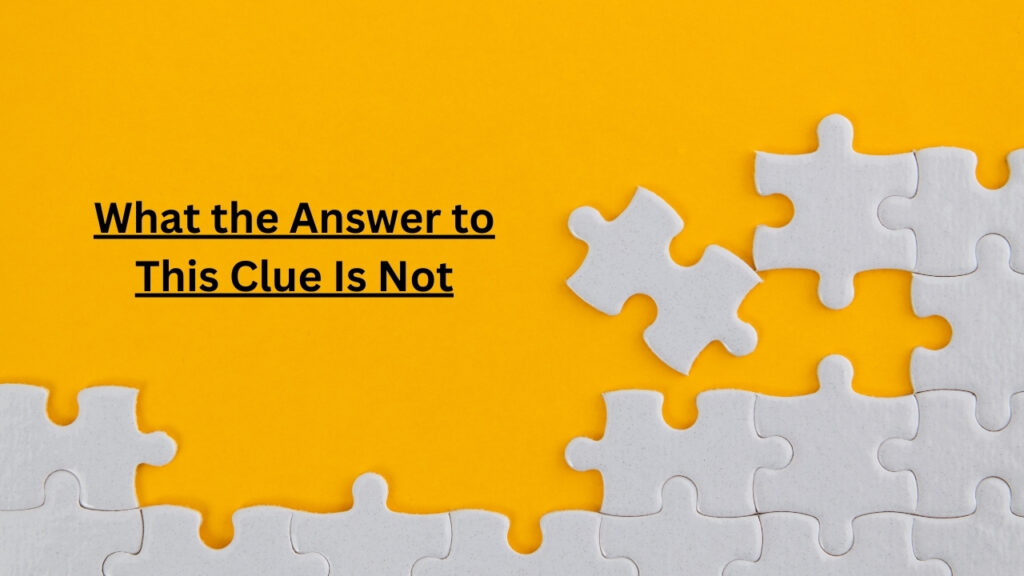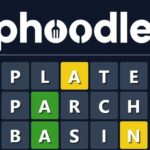Crossword puzzles often contain clever and tricky clues that can stump even the most experienced solvers. One such clue that has baffled many is “What the answer to this clue is not (it’s two!).” This guide will help you understand and solve this perplexing clue, ensuring you never get stuck on it again.
What the Answer to This Clue Is Not
The clue “What the answer to this clue is not (it’s two!)” is a classic example of a cryptic crossword clue. Cryptic clues often involve wordplay, puns, and lateral thinking. Let’s break down this clue step by step.
What the Answer to This Clue Is Not: Clue Analysis
- Phrase Analysis: The clue states, “What the answer to this clue is not.”
- Hint: The parenthetical hint “it’s two!” suggests the answer is related to the number two in some way.
- Wordplay: Cryptic clues often use wordplay. Here, the clue is a playful paradox, where the answer is something the clue explicitly states it is not.
Possible Solution
Breaking Down the Clue
- The clue tells us what the answer is not.
- It also gives us a hint that “it’s two!”.
- Therefore, the answer must be a word that means “not two.”
Final Solution
Given the analysis, the answer to the clue “What the answer to this clue is not (it’s two!)” is “ONE”.
Explanation
- “ONE” is the answer because it is not “two,” fitting perfectly with the clue’s stipulation.
- The hint “it’s two!” helps direct solvers to think about numbers, leading them to deduce that “one” is indeed “not two.”
Strategies for Solving Cryptic Clues
Look for Contradictions
Cryptic clues often contain contradictions or paradoxes. Recognizing these can help you understand the wordplay involved.
Use Hints
Pay attention to any additional hints provided in the clue, such as the parenthetical “it’s two!” in this case. These can guide your thought process towards the correct answer.
Think Outside the Box
Cryptic clues require lateral thinking. Don’t take the clue at face value; instead, consider alternative interpretations and wordplay.
Practice Regularly
The more you practice solving cryptic crosswords, the better you’ll become at recognizing the common types of wordplay and clues used.
Common Types of Cryptic Clues
Anagrams
Anagram clues involve rearranging letters to form a word that fits the definition given in the clue.
Double Definitions
These clues use a word that has two different meanings, both of which fit the clue.
Homophones
Homophone clues use words that sound alike but have different meanings or spellings.
Hidden Words
In hidden word clues, the answer is hidden within the clue itself.
Charades
Charades clues break the answer into parts, with each part being clued separately.
Conclusion
The crossword clue “What the answer to this clue is not (it’s two!)” is a perfect example of how cryptic crosswords use wordplay and lateral thinking to create engaging and challenging puzzles. The answer, “ONE,” fits the clue’s paradoxical statement and provides a satisfying solution. By understanding the types of wordplay used in cryptic clues and practicing regularly, you can improve your crossword-solving skills and enjoy the mental exercise they provide. Happy puzzling
FAQs About Cryptic Crossword Clues
What are cryptic crossword clues?
Cryptic crossword clues are a type of crossword puzzle clue that involves wordplay, puns, and lateral thinking. They often require solvers to look beyond the obvious meaning of the words.
How can I improve my cryptic crossword-solving skills?
Improving your skills involves regular practice, familiarizing yourself with common clue types, and learning to recognize patterns in wordplay and definitions.
What should I do if I’m stuck on a cryptic clue?
If you’re stuck, try to break down the clue into parts, look for any potential wordplay or puns, and consider alternative interpretations of the words used.
Are there resources to help with cryptic crosswords?
Yes, there are many online resources, including crossword dictionaries, forums, and websites dedicated to explaining cryptic crossword clues and providing solving tips.
Why are cryptic crosswords challenging?
Cryptic crosswords are challenging because they require a combination of vocabulary knowledge, lateral thinking, and the ability to recognize and interpret various types of wordplay.
Can solving cryptic crosswords improve cognitive abilities?
Yes, regularly solving cryptic crosswords can enhance cognitive functions such as memory, problem-solving skills, and verbal reasoning, making it a beneficial activity for mental health.



